外研版(2019)必修 第一册Unit 2 Exploring EnglishDeveloping ideas—读写·体现学以致用PPT(共82张PPT)
文档属性
| 名称 | 外研版(2019)必修 第一册Unit 2 Exploring EnglishDeveloping ideas—读写·体现学以致用PPT(共82张PPT) | 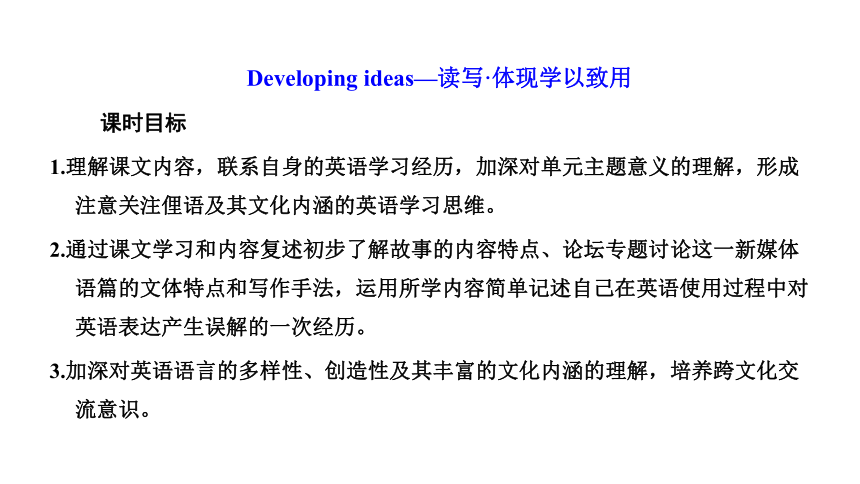 | |
| 格式 | zip | ||
| 文件大小 | 922.2KB | ||
| 资源类型 | 教案 | ||
| 版本资源 | 外研版(2019) | ||
| 科目 | 英语 | ||
| 更新时间 | 2022-12-14 08:04:01 | ||
图片预览

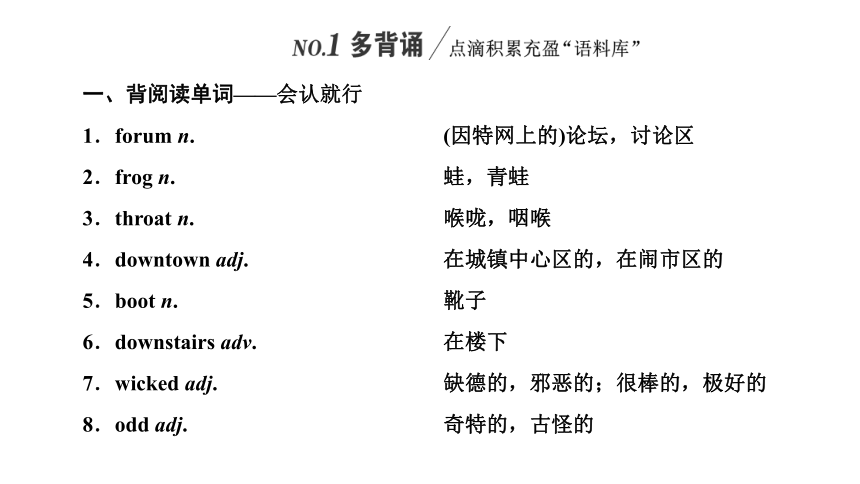

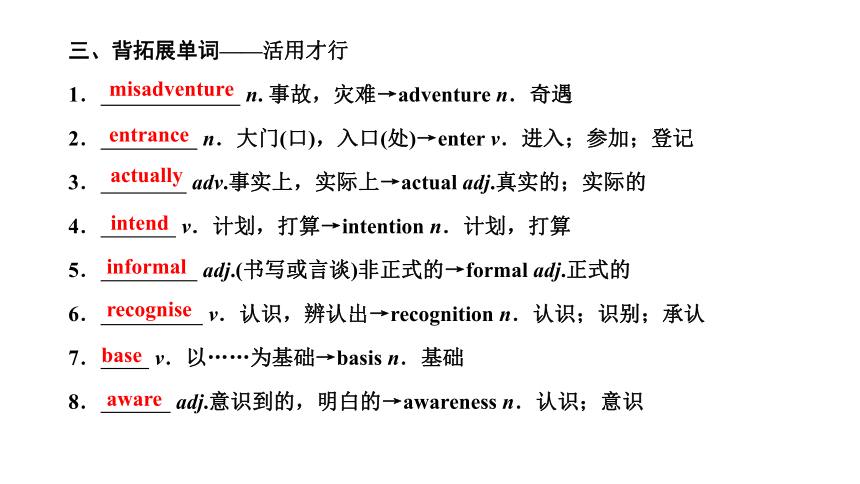
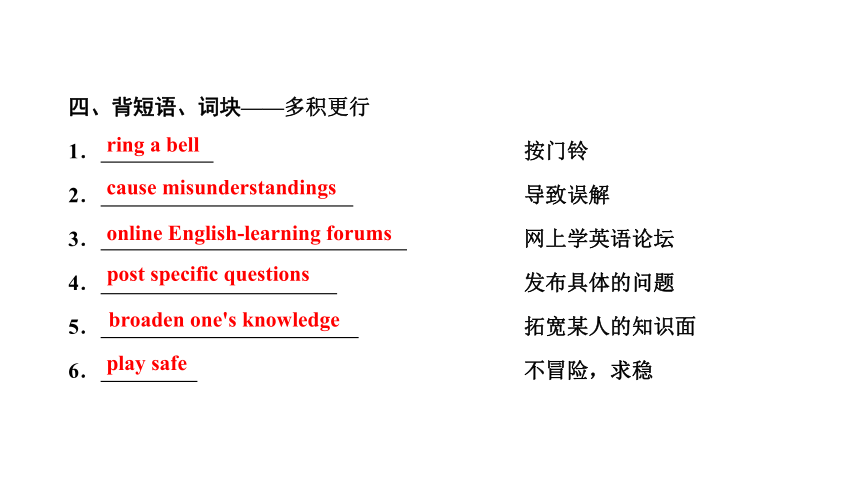
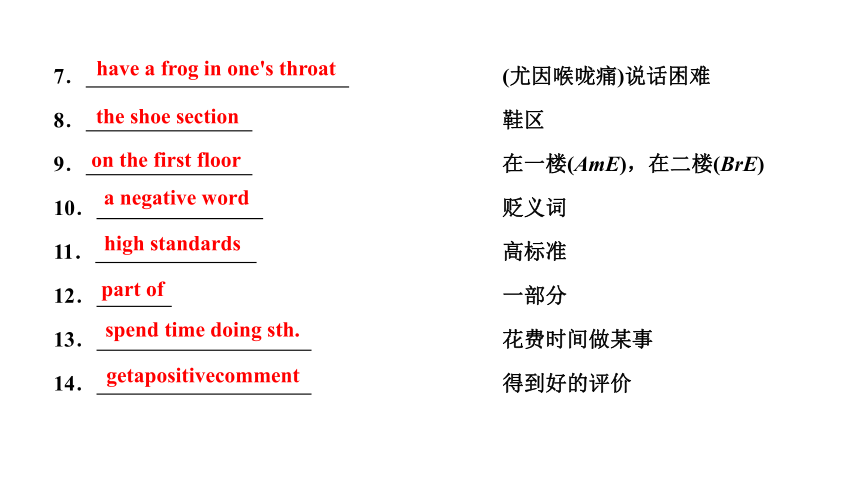
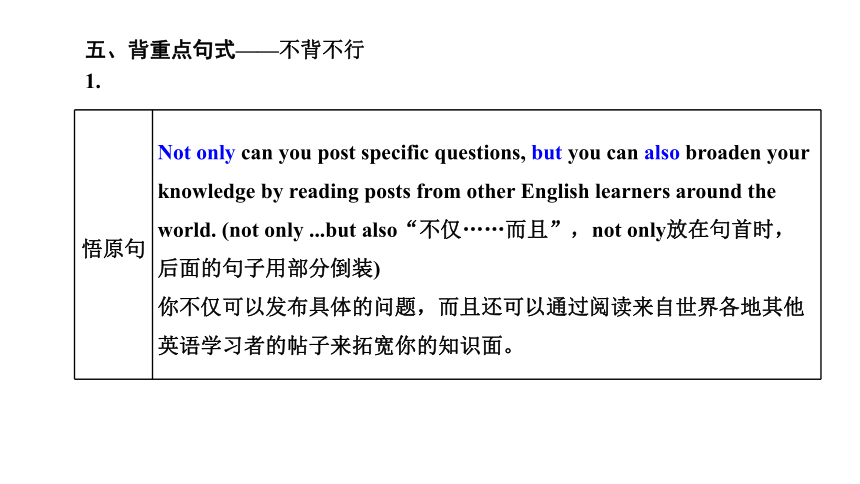
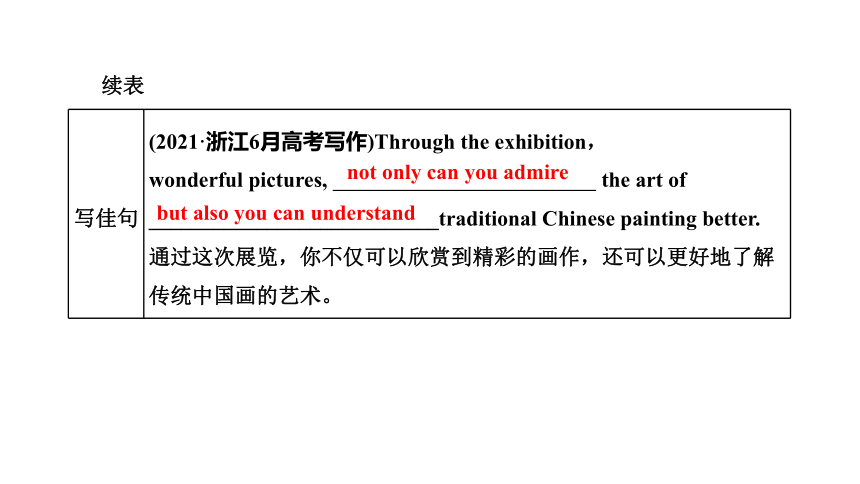
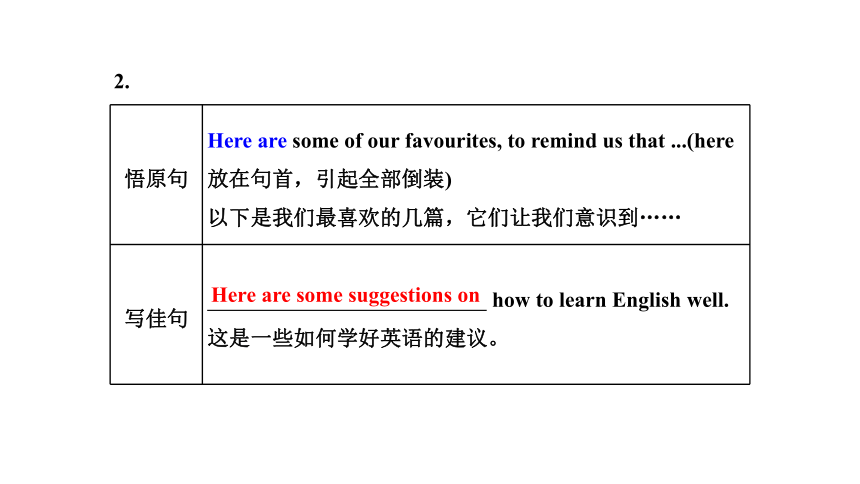
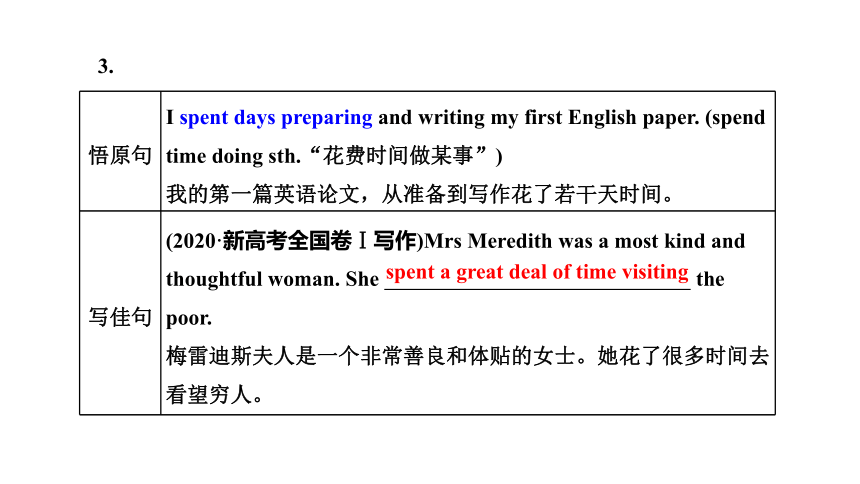
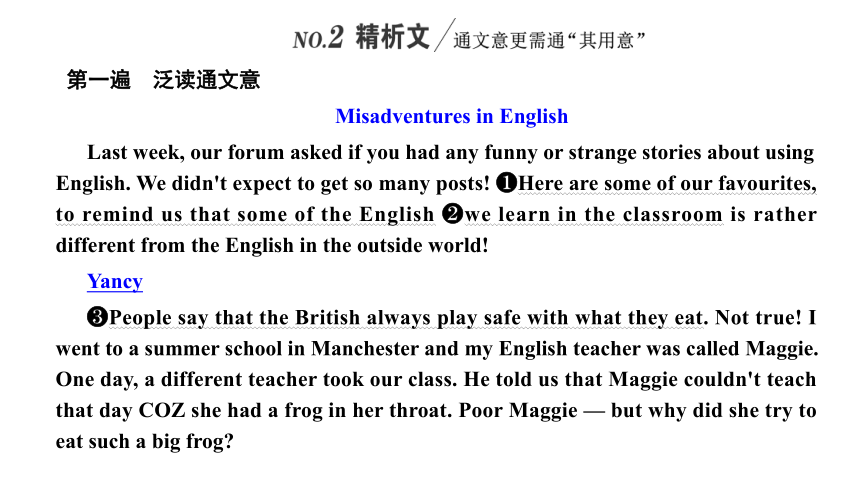
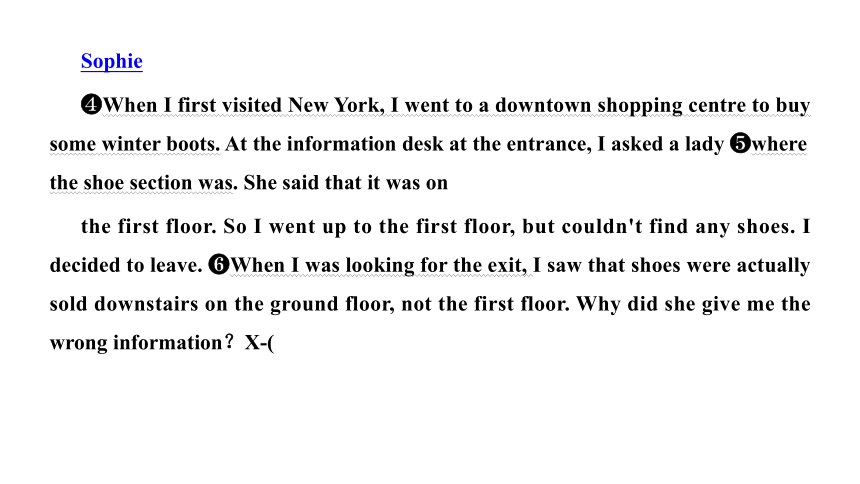
文档简介
(共82张PPT)
Developing ideas—读写·体现学以致用
课时目标
1.理解课文内容,联系自身的英语学习经历,加深对单元主题意义的理解,形成注意关注俚语及其文化内涵的英语学习思维。
2.通过课文学习和内容复述初步了解故事的内容特点、论坛专题讨论这一新媒体语篇的文体特点和写作手法,运用所学内容简单记述自己在英语使用过程中对英语表达产生误解的一次经历。
3.加深对英语语言的多样性、创造性及其丰富的文化内涵的理解,培养跨文化交流意识。
一、背阅读单词——会认就行
1.forum n. (因特网上的)论坛,讨论区
2.frog n. 蛙,青蛙
3.throat n. 喉咙,咽喉
4.downtown adj. 在城镇中心区的,在闹市区的
5.boot n. 靴子
6.downstairs adv. 在楼下
7.wicked adj. 缺德的,邪恶的;很棒的,极好的
8.odd adj. 奇特的,古怪的
二、背重点单词——写对才行
1. n. 资料,(教学)资源
2. v. 提醒,使……想起
3. adv. 相当,颇
4. n. 评论
5. n. 区域
6. n. 出口
7. adj. 消极的,负面的
8. n. 错误,谬误
resource
remind
rather
comment
section
exit
negative
error
三、背拓展单词——活用才行
1. n. 事故,灾难→adventure n.奇遇
2. n.大门(口),入口(处)→enter v.进入;参加;登记
3. adv.事实上,实际上→actual adj.真实的;实际的
4. v.计划,打算→intention n.计划,打算
5. adj.(书写或言谈)非正式的→formal adj.正式的
6. v.认识,辨认出→recognition n.认识;识别;承认
7. v.以……为基础→basis n.基础
8. adj.意识到的,明白的→awareness n.认识;意识
misadventure
entrance
actually
intend
informal
recognise
base
aware
四、背短语、词块——多积更行
1. 按门铃
2. 导致误解
3. 网上学英语论坛
4. 发布具体的问题
5. 拓宽某人的知识面
6. 不冒险,求稳
ring a bell
cause misunderstandings
online English-learning forums
post specific questions
broaden one's knowledge
play safe
7. (尤因喉咙痛)说话困难
8. 鞋区
9. 在一楼(AmE),在二楼(BrE)
10. 贬义词
11. 高标准
12. 一部分
13. 花费时间做某事
14. 得到好的评价
have a frog in one's throat
the shoe section
on the first floor
a negative word
high standards
part of
spend time doing sth.
getapositivecomment
五、背重点句式——不背不行
1.
悟原句 Not only can you post specific questions, but you can also broaden your knowledge by reading posts from other English learners around the world. (not only ...but also“不仅……而且”,not only放在句首时,后面的句子用部分倒装)
你不仅可以发布具体的问题,而且还可以通过阅读来自世界各地其他英语学习者的帖子来拓宽你的知识面。
写佳句 (2021·浙江6月高考写作)Through the exhibition, wonderful pictures, the art of ___________________________traditional Chinese painting better.
通过这次展览,你不仅可以欣赏到精彩的画作,还可以更好地了解传统中国画的艺术。
续表
not only can you admire
but also you can understand
2.
悟原句 Here are some of our favourites, to remind us that ...(here放在句首,引起全部倒装)
以下是我们最喜欢的几篇,它们让我们意识到……
写佳句 how to learn English well.
这是一些如何学好英语的建议。
Here are some suggestions on
3.
悟原句 I spent days preparing and writing my first English paper. (spend time doing sth.“花费时间做某事”)
我的第一篇英语论文,从准备到写作花了若干天时间。
写佳句 (2020·新高考全国卷Ⅰ写作)Mrs Meredith was a most kind and thoughtful woman. She the poor.
梅雷迪斯夫人是一个非常善良和体贴的女士。她花了很多时间去看望穷人。
spent a great deal of time visiting
第一遍 泛读通文意
Misadventures in English
Last week, our forum asked if you had any funny or strange stories about using English. We didn't expect to get so many posts! Here are some of our favourites, to remind us that some of the English we learn in the classroom is rather different from the English in the outside world!
Yancy
People say that the British always play safe with what they eat. Not true! I went to a summer school in Manchester and my English teacher was called Maggie. One day, a different teacher took our class. He told us that Maggie couldn't teach that day COZ she had a frog in her throat. Poor Maggie — but why did she try to eat such a big frog
Sophie
When I first visited New York, I went to a downtown shopping centre to buy some winter boots. At the information desk at the entrance, I asked a lady where the shoe section was. She said that it was on
the first floor. So I went up to the first floor, but couldn't find any shoes. I decided to leave. When I was looking for the exit, I saw that shoes were actually sold downstairs on the ground floor, not the first floor. Why did she give me the wrong information?X-(
Julien
I've got an English penfriend, who I finally got to meet in London this summer. He had told me that his grandfather was “really wicked”. But when I met his grandfather, I liked him a lot. I found it very odd. Why did my friend use a negative word about such a nice man
Zheng Xu
The British must have really high standards. I was part of a student exchange programme between a university in England and my university in China. I spent days preparing and writing my first English paper. I knew I had done a good job and was looking forward to getting a positive comment. When I got the paper back, I found my teacher had written the comment “Not bad!” Not bad But there weren't any errors in my paper.:-(
[参考译文]
英语尴尬事
上个星期,我们在论坛里问大家在使用英语时有没有遇到过什么搞笑或者离奇的事情。我们没想到会收到这么多回帖!以下是我们最喜欢的几篇,它们让我们意识到,有些在课堂上学到的英语和在课堂之外使用的英语真是太不一样了!
[句式释解]
句 here放在句首,引起全部倒装;that引导的宾语从句,作remind的宾语。
句 此处为省略了关系代词that/which的定语从句,修饰先行词some of the English。
扬西
都说英国人吃东西很谨慎。才不是呢!我在曼彻斯特参加过一个暑期培训班,我的英语老师叫玛吉。有一天,另外一个老师来给我们代课。他说玛吉老师没法来上课,因为她的喉咙里卡了一只青蛙。可怜的玛吉老师——可是她为什么要吃那么大的青蛙呢?
[句式释解]
句 that引导宾语从句,作say的宾语;what引导宾语从句,作介词with的宾语。
索菲
第一次去纽约的时候,我去市中心一家购物中心买冬靴。我在入口处问服务台的女士卖鞋的地方在哪里。她告诉我在二楼。于是我上到二楼,但是并没有找到鞋,所以决定离开。就在我找出口的时候,我发现鞋区是在一楼,不在二楼。她为什么告诉我错误的信息呢?X-(
[句式释解]
句 when引导时间状语从句,to buy ...为不定式短语作目的状语。
句 where在此引导宾语从句,作asked的宾语。
句 when在此引导时间状语从句。
朱利恩
我有个英国笔友,今年夏天我们终于在伦敦见面了。他以前跟我说他的爷爷“很邪恶”。可我一见到他的爷爷就很喜欢他。我觉得好奇怪。我的朋友为什么用一个贬义词来形容这么好的人呢?
[句式释解]
句 who在此引导非限制性定语从句,修饰先行词penfriend,who在从句中作meet的宾语。
郑旭
英国人的标准一定很高很高。我在中国上的大学和英国一所大学有一个交换项目,我作为交换生到英国学习。我的第一篇英语论文,从准备到写作花了若干天时间。我知道自己写得很好,也期待着老师积极的评价。可是论文发下来后,我发现老师的评语竟然是“不算差!”。不算差?可是我的论文里什么错误也没有呀。:-(
第二遍 精读提素养
步骤一|先明文章主旨大意,知写了什么
The passage is mainly about .
A.an exciting adventure in English learning
B.some strange English words difficult to learn
C.the differences between some English in class and in life
D.some funny posts about what we should learn in class
答案:C
步骤二|再逐段精读文章,看怎样写的
阅读文章第1段,完成下列题目
1.What did the forum collect last week
2.Is some of the English learned in the classroom same as that in the outside world
Funny or strange storiesaboutusingEnglish.
No, itisn't.
阅读文章第2、3段,完成下列题目
1.文意的理解
(1)Write T (true) or F (false).
①It is said that British are always careful about their food. ( )
②Maggie ate a big frog. ( )
③When Sophie first visited New York, she wanted to buy a pair of winter shoes. ( )
④The lady at the entrance gave Sophie the wrong information. ( )
T
F
F
F
(2)What does Yancy think of the British attitude towards their food
A.Doubtful. B.Supportive.
C.Helpless. D.Hopeful.
答案:A
(3)Which post do you find most interesting Why
I feel Yancy's post most interesting. Because I'm interested in
English idioms very much.
2.表达的技巧
英语俚语是指民间非正式、较口语的语句,是百姓在日常生活中总结出来的通俗易懂、顺口的具有地方色彩的词语,是英语学习中非常重要的一部分。如同汉语中的谚语一样,英语俚语也具有生动、简洁和趣味性的特性,能为语言增添活力,又方便人们的记忆。由于俚语来源于人们在日常生活中的总结,所以它的使用也比较广泛。作为一名英语的学习者,应当注意培养自己的俚语意识,运用到自己的口头和书面交际中去。例如第二段中使用了“have a frog in one's throat(〈尤因喉咙痛〉说话困难)”这一俚语。
试翻译下面的俚语:
①against clock _______
②cry over spilled milk __________________
③drive sb. bananas _______
④top banana ___________
⑤get up on the wrong side of the bed ________
⑥raining cats and dogs _________
争分夺秒
为过去的失败而懊丧
惹怒某人
领袖,大老板
心情不佳
下着倾盆大雨
阅读文章第4、5段,完成下列题目
1.文意的理解
(1)In fact, Julien found his penfriend's grandfather .
A.wicked B.confused C.negative D.nice
答案:D
(2)What do we learn about Zheng Xu's English paper
A.Zheng Xu felt disappointed about his paper.
B.Zheng Xu didn't get a good grade on it.
C.The teacher thought the paper wrote well.
D.The teacher thought Zheng Xu was not a bad student.
答案:C
2.表达的技巧
代词it的用法比较多,其中最基本的用法就是用作“人称代词”。it作人称代词,可在句中指代人、想象中的人、不明性别的婴儿或未弄清的人或事物。也可用来代指一件事情。例如第四段中Julien的这句话:“I found it very odd.”,其中it指代上文的内容,即my penfriend's saying that his nice grandfather is really wicked。
请完成下列题目:
①I had a talk with my sister about my school life. It was very useful.
在上面这句话中,it指“ ”这件事情。
②My parents warn us not to play with fire, but we don't take it seriously.
在上面这句话中,it指“ ”这件事情。
关于学校生活的谈话
父母不让我们玩火
步骤三|读后理层次结构,析有何逻辑
本文为新媒体语篇(论坛专题讨论),语篇结构为“总—分”。论坛征集有关英语使用过程中遇到的搞笑或离奇的事情——Yancy的故事——Sophie的故事——Julien的故事——Zheng Xu的故事。
阅读技巧:新媒体语篇多为“总—分”结构,多出现在阅读理解语篇中,这类语篇常命制细节理解题。考生可以根据语篇结构,定位细节理解题所在段落,从而快速解题。
步骤四|最后知选文意图,思有何价值
学会消除误解
在日常生活中,同学之间经常会发生各种各样的误会。当发生误会和矛盾后,如果不懂得如何消除,情绪就会受到很大的困扰,甚至会做出一些冲动的事情。因此学会消除误会和矛盾就显得十分必要。由本文所知,四个人之所以产生误解,就是因为对英语语言和文化的不理解所导致。因此,我们在日常生活中,如果产生了误解,就要学会分析产生误解的原因,从而消除误解。
请体会并记住下面的句子:
①He who makes no mistakes will do nothing.
不犯错误的人将一事无成。
②To deny a mistake is to repeat it.
否认错误,就是重犯错误。
③Take advantage of others' strengths and make up for their weaknesses.
取人之长,补己之短。
第一板块 单词和短语——点点清
1.Here are some of our favourites, to remind us that ...
以下是我们最喜欢的几篇,它们让我们意识到……
★remind v. 提醒,使……想起
[用法感知]
①(以文化人助写作)Lu Xun reminded himself to get up early by carving “morning” on his desk.
鲁迅在他的桌子上刻了“早”字来提醒自己早起。
②In case I forget, please remind me of my promise.
以防我忘记,请提醒我一下我的许诺。
③Please remind me to call him up before noon.
=Please remind me that I will call him up before noon.
请提醒我在中午前给他打电话。
[归纳点拨]
remind sb. of sth. 提醒某人某事;让某人想起某事
remind sb.to do sth. 提醒某人做某事
remind sb.that/what ... 使某人想起……;提醒某人……
keep sb.reminded of 使某人想起…… ;提醒某人……
[应用融会] (单句语法填空/完成句子)
④The old photos reminded me the days I spent in the countryside.
⑤We put up a board to remind people (protect) the trees.
⑥Can someone remind me I should do next
⑦He put up a photo of Tsinghua University to .
他贴了一张清华大学的照片提醒自己不要忘记自己的梦想。
of
to protect
what
remind himself of his own dreams
2.I was part of a student exchange programme between a university in England and my university in China.
我在中国上的大学和英国一所大学有一个交换项目,我作为交换生到英国学习。
★exchange vt.& n.交换;互换
[用法感知]
①The activity is designed for exchange students and I find it very useful.
这个活动是专门为交换生而设计的,并且我发现它很有用。
②If you are not satisfied with this dress, you can exchange it for another.
如果你对这件裙子不满意,你可以换另外一件。
③Mary is giving me English lessons in exchange for my teaching her Chinese.
玛丽给我上英语课,作为交换我教她汉语。
[归纳点拨]
(1)exchange sth. for sth. 以某物换取某物
exchange sth. with sb. 和某人交换某物
(2)make an exchange 交换
in exchange for ... 以……交换……
an exchange student 交换生
[应用融会] (单句语法填空/翻译句子)
④We students should often exchange ideas our parents, who are rich in experience, and above all, love us most in the world.
⑤I am going to travel abroad, so I want to exchange some RMB dollars in the bank.
⑥Would you like my old TV exchange for this camera
⑦我是一名来自英国的交换生。
with
for
in
I'm an exchange student from the UK.
[易混辨析] exchange, change
exchange 表示give and receive (sth. in return for sth. else),强调“不仅给予而且得到”
change 表示become different,强调“变化,改变”
轻巧识记
3.When I got the paper back, I found my teacher had written the comment “Not bad!”
可是论文发下来后,我发现老师的评语竟然是“不算差!”。
★comment n.&v. 评论
[用法感知]
①Don't comment on/upon the matter in public.
不要在公众场合对此事作出评论。
②He commented that the apartment was rather beautiful.
他评论说这套公寓相当美。
③No comment!I don't know anything.
无可奉告!我什么都不知道。
[归纳点拨]
(1)make comments on/upon sth. 评论某事
no comment 无可奉告
(2)comment on/upon 对……发表评论
comment that ... 评论……
[应用融会]
(1)单句语法填空
④She made helpful (comment) on my work.
⑤I knew nothing about the incident so I refused to comment it.
(2)一句多译
老师经常谈论那两个男孩的不同之处。
⑥ ______________________________________________________________
(comment v.)
⑦
(comment n.)
comments
on/upon
The teacher often comments on/upon how different the two boys are.
The teacher often makes comments on/upon how different the two boys are.
(3)词汇升级
⑧I don't feel I can give an opinion about their decision.
comment on
4.morally wrong and intending to hurt people
道德上是错误的并意图伤害他人
★intend v.计划,打算
[用法感知]
①The village official intended to lead the villagers to beautify their environment.
这个村干部打算带领村民美化他们的环境。
②My father intended me to become a doctor,which was against my will.
我的父亲打算让我做医生,这违背了我的意愿。
③The school being built now is said to be intended for the disabled children.
目前正在建设中的那所学校据说是为残疾儿童建立的。
[归纳点拨]
(1)intend to do/doing sth. 打算做某事
intend sb. to do sth. 打算让某人做某事
had intended to do sth.=intended to have done sth.
本打算做某事(但没有做)
(2)intended adj. 为……打算(或设计)的
be intended to do 为了做……
be intended for 专门为……而设计的;
专供……使用的
(3)intention n. 目的;意图
[应用融会] (单句语法填空/完成句子)
④The book written by the famous writer is intended children.
⑤They intended the plan (put) into practice within this year.
⑥He left England with the (intend) of travelling in Africa.
⑦Out of kindness, he care for the old man who was suffering from sickness.
出于好意,他打算照顾这个生病的老人。
for
to be put
intention
intended to
5.write a story based on given pictures
以所给的图画为基础写一个故事
★base v.以……为基础
[用法感知]
①Theory is based on practice and in turn serves practice.
理论以实践为基础,反过来又服务于实践。
②One should always base his opinions on facts.
一个人应该始终以事实为依据发表自己的观点。
③The first thing that we should do is to master the basic grammar.
我们要做的第一件事是掌握基础的语法。
[归纳点拨]
(1)base ... on/upon ... 以……为……的基础
be based on/upon 以……为基础/依据
(2)basic adj. 基本的;基础的
[应用融会] (单句语法填空/完成句子)
④It is important that you should base your conclusion careful research.
⑤It is said that the film (base) on a novel by a young writer.
⑥Schools have rights to set down their own rules (base) on the students.
⑦In my diary, I set down a series of things that were all .
在我的日记里,我记下了一系列有事实根据的事情。
on/upon
is based
based
based on/upon facts
6.be aware of cultural differences
意识到文化差异
★be/become aware of 意识到,察觉到
[用法感知]
①(以文化人助写作) In conclusion, people around the world should be aware of the real situation of water shortage.
总之,全世界的人们应该意识到水资源短缺的真实情况。
②All of a sudden, I became aware that I had made a serious mistake.
突然,我意识到我已经犯了一个严重的错误。
③Our headmaster asked us to raise our competitive awareness in modern society.
校长要求我们提高在现代社会里的竞争意识。
[归纳点拨]
(1)be aware that ... 知道/体会到……
as far as I'm aware 据我所知
(2)awareness n. 意识;认识
develop an awareness of 培养……的意识
raise awareness of 提高……认识
[应用融会] (单句语法填空/完成句子)
④As a member of society, I'm aware being responsible is what it takes to make a better society.
⑤It is important that the students develop an (aware) of how the Internet can be used.
⑥All the people should the risks of smoking.
所有人应该提高吸烟有害的认识。
that
awareness
raiseawarenessof
第二板块 句式和语法——句句通
I spent days preparing and writing my first English paper.
我的第一篇英语论文,从准备到写作花了若干天时间。
[归纳点拨]
[应用融会]
(1)单句语法填空/完成句子
①He doesn't spend much time his homework.
②It took us three days (finish) the work.
③There is no doubt that he has spent .
毫无疑问,他花了太多的时间看电视。
on
to finish
too much time in watching TV
(2)一句多译
我花了十元买这本书。
④The book cost me ten yuan. (cost)
⑤ (pay)
⑥ (take)
⑦ (spend)
I paid ten yuan for the book.
It took me ten yuan to buy the book.
I spent ten yuan in buying/on the book.
写作项目——Writing a story about a misunderstanding in English
本单元的写作任务是写一篇故事类短文,体裁为记叙文。有时是根据所提供的一幅或几幅图的信息写短文,有时是根据所提供的文字信息写短文。
(一)常见写作范式
(二)写作要点指津
写这类文章时,一定要注意记叙文的六大要素,仔细推敲人物与事件的关系,并作适当补充,增加一些必要的过渡词,使故事的叙述更加合理,具体做法如下:
1.分析人物与事件的关系,使之有机地结合起来,确保内容连贯、合理。
2.提炼要点与细节,然后将所列要点用地道的英语句子表达出来。
3.用恰当的过渡词把句子连接成文,使文章衔接自然、行文流畅。
4.恰当运用并列句、复合句、非谓语动词、强调句、倒装句等,长短句交错使用,避免行文单调。
积素材充盈写作“语料库”
(一)背写作词汇
1.amazing adj. 令人惊异的
2.surprised adj. 吃惊的
3.strange adj. 奇怪的
4.terrible adj. 可怕的,糟糕的,令人讨厌的
5.typical adj. 典型的,特有的
6.be going to do 打算做……
7.be sure 肯定……
8.to one's astonishment 令某人吃惊的是
9.decide to do sth. 决定做某事
10.prepare/hope/wish/want to do sth. 准备/希望/想做某事
(二)背写作佳句
[常用开头句]
1.It happened ...
事情发生在……
2.With the coming of ..., ...are eager to express respect and love for ...
随着……的到来,……渴望表达对……的尊敬和爱戴。
3.On ...I was ...as usual. Suddenly, I ...
在……我像往常一样……。突然,我……
4.It happened ...I still remember when ...It impressed me most because ...
它发生在……我仍然记得当时……它留给我的印象最深刻,因为……
[常用中间句]
1.Firstly ...and secondly ...To make matters worse ... As a result ...
第一……第二……更糟糕的是……结果……
2.At first ...and at the same time ...At last ...
首先……与此同时……最后……
3.As a matter of fact ...事实上……
4.I was really surprised when ...
当……时,我真的太吃惊了。
5.I wasn't sure whether ...我不确定是否……
6.To my astonishment ... 令我吃惊的是……
7.So it is of great importance for me to show my respect for ...
所以对于我来说,对……表示我的尊敬是很重要的。
8.On one hand ...on the other hand .../For one thing ...for another ...
一方面……另一方面……
[常用结束句]
1.Considering all these/Taking all these into consideration ...On one hand ...on the other hand ...In conclusion ...
考虑到……一方面……另一方面……总之……
2.On my way back to ...I thought a lot ...Moreover/What's more ...If we are always ready to ...
在我回……的路上,我想了很多……而且……如果我们时刻做好准备去……
3.Considering all these, I believe that ...First of all ...Furthermore/Besides ...Therefore ...
考虑到……我相信……首先……而且……因此……
4.It turns out that ...
结果是……
(三)背续写素材
读后续写微技能——
构思微型故事(看词句构思微段)
Last summer,I stayed with a British host family. One day, I was really surprised when Jeremy,the son of the family,told me that we would have toad-in-the-hole for dinner. I wasn't sure whether we were going to eat a real toad in hole. If so, how terrible! I joined them at dinner time with butterflies in my stomach.To my astonishment, a dish of sausages cooked in Yorkshire pudding (a mix that tastes a bit like pancakes)was served on the table,and it tasted delicious.It turned out that toad-in-the-hole is a typical dish for a British dinner, and there's no toad!What an amazing experience! It was interesting to try such yummy food with a strange name.
去年夏天,我住在一个英国寄宿家庭。有一天,我真的很惊讶,这个家庭的儿子Jeremy告诉我,我们晚餐要吃洞中的癞蛤蟆。我不确定我们是否会吃一只洞里的真的癞蛤蟆。如果是这样,太可怕了!我心中忐忑地和他们一起去吃晚餐。令我惊讶的是,桌上摆着一盘用约克郡布丁(一种味道有点像煎饼的混合物)烹制的香肠,味道很好。原来洞里的癞蛤蟆是英国晚餐的一道典型菜,并且没有癞蛤蟆!一次多么令人惊奇的经历啊!品尝拥有奇怪名字的美味很有趣。
[应用体验]
假定你是新华中学的学生李华,美国交换生Jack正在你们学校学汉语。他觉得自己的汉语学得很不错了,但在理解中国小吃的名称方面仍有困难。前几天你带他吃“老婆饼”和“叫花鸡”,他觉得很奇怪,吃后却觉得好吃。请你写一则故事记叙这件事。
注意:1.写作词数应为80左右;
2.可以适当增加细节,以使行文连贯。
参考词汇:小吃snack;老婆饼wife-cake;叫花鸡Beggar's Chicken
根据括号内的汉语提示补全短文
① (我依然记得那个时候) I advised Jack to taste Chinese snacks — wife-cakes and a Beggar's Chicken.
Jack, an American exchange student, is my friend who thinks his Chinese is not bad but still ② (理解中国小吃的名字有困难). He likes Chinese dumplings. However, he doesn't like the names of some Chinese snacks, ③ (也不想去吃它们).
I still remember when
has some trouble understanding the names of Chinese snacks
and neither does he want to eat them
One day I bought him some tasty wife-cakes and a Beggar's Chicken. ④_________ ________________________________(让我吃惊的是,他不愿品尝它们) because of misunderstanding their names. I spent a long time persuading him to eat them.
On trying, he ate them up. ⑤ ________________________________________
_______________(结果他爱上了这些中国小吃), which reflect the wisdom of Chinese.
To my
astonishment, he wouldn't try them
It turned out that he fell in love with these
Chinese snacks
Ⅰ.单词拼写
1.The site has three main (区域): Vocabulary, Grammar, and Expressions & Idioms.
2.You (使……想起) me so much of your brother, especially when you smile.
3.We need free ourselves from (消极的,负面的) attitudes.
4.Some people pay more attention to the (评论) than the quality of products.
sections
remind
negative
comments
5.The maths examination was (相当) difficult; to our joy, a number of students passed it.
6.She looks a bit (古怪的). I wonder what has happened to her.
7.He survived a series of (灾难), including the loss of his boat and suffering in jail.
8.I (打算) to visit him, but I was afraid I would disturb him.
9.No payments were made last week because of a computer (错误).
10.Kuwait is rich in oil (资源).
rather
odd
misadventures
intended
error
resources
Ⅱ.单句语法填空
1.We should base our health balanced diet.
2.I'd rather you didn't make any comment the issue now.
3.I intend (take) full advantage of this trip to buy the things we need.
4.Not only you but also he (be) fond of the book.
5.We look forward to (see) Mrs Brown and her children this evening.
on
on
to take
is
seeing
6.Tom suddenly became aware people looking at him.
7.The children's naive looks remind me my childhood.
8.I think I definitely have frog in my throat.
9.Here (be) some tips to help you.
10.The film star wears sunglasses. Therefore, he can go shopping without ________________(recognise).
of
of
a
are
being recognised
Ⅲ.选词填空
1.He didn't come to school today because he .
2.I do receiving your reply as soon as possible.
3.Only if you the importance of English can you learn it well.
4.Let's and make enough preparations.
5.Good luck.I'm sure you will .
6.People in the town started rude his bad behaviour.
do a good job, have a frog in one's throat, play safe, look forward to, make ... comment on, be aware of
had a frog in his throat
look forward to
are aware of
play safe
do a good job
making
comments on
Ⅳ.完成句子
1.I the task.
我花了三个小时的时间完成这项任务。
2. from the experiments.
以下就是实验的结论。
3.Not only French,but also she knows how to type.
玛丽不仅会说法语,而且还会打字。
spent three hours (in) finishing
Here are the conclusions
Does Marys peak
4.I'd like to hear your advice on to get along with him.
我想听听你的建议,和他相处最好的方式是什么。
5.I will take full advantage of the chance to .
我将充分利用这个机会和他们交换意见。
what is the best way
exchange views with them
Ⅴ.课文语法填空
Last week, our forum asked if you had any funny or strange stories about using English. Here 1. (be) some posts to remind us that some of the English we learn in the classroom is rather different 2. the English in the outside world!
One day, Yancy's English teacher couldn't teach because she had a frog 3.__ her throat. Yancy 4. (wonder) why she tried to eat such a big frog.
When Sophie went to a shopping centre to buy some winter 5. (boot), a lady told her that the shoe section was on the first floor, but she couldn't find any shoes there. Finally she found that shoes were 6. (actual) sold on the ground floor, not the first floor.
are
from
in
wondered
boots
actually
Julien's English penfriend had told Julien that his grandfather was “really wicked”. But Julien liked his grandfather a lot. He 7. (find) it very odd that his friend used a negative word about such a nice man.
Zheng Xu, 8. was an exchange student, believed the British must have really high standards. He spent days 9. (prepare) and writing his first English paper. He knew he had done a good job and was looking forward to 10. _______(get) a positive comment, but he found his teacher had written the comment “Not bad!” But there weren't any errors in his paper
found
who
preparing
getting
Ⅵ.应用文写作
假定你是李华,是高一(1)班的班长。请你根据以下内容给新任外教Mr Smith 写一封信,向他表示欢迎并转达同学们对英语课的期望:
1.介绍西方文化;2.组织多样活动;3.关注学生发音。
注意:1.写作词数应为80左右;
2.请按如下格式作答。
Dear Mr Smith,
I'm writing on behalf of my class to
Yours,
Li Hua
参考范文:
Dear Mr Smith,
I'm writing on behalf of my class to extend our warm welcome to you. Here are some of our expectations for your English class.
First, we'd like to have topics in class about western culture. We are all very interested in knowing more about the culture behind the language. Besides, we'd appreciate various activities to get everyone involved in speaking English. Last but not the least, please give us some guidance and training in our pronunciation, because we all hope to speak English fluently and clearly just as you native speakers do.
Thank you very much. Looking forward to meeting you!
Yours,
Li Hua
“课时跟踪检测”见“课时跟踪检测(三)”
(单击进入电子文档)
Developing ideas—读写·体现学以致用
课时目标
1.理解课文内容,联系自身的英语学习经历,加深对单元主题意义的理解,形成注意关注俚语及其文化内涵的英语学习思维。
2.通过课文学习和内容复述初步了解故事的内容特点、论坛专题讨论这一新媒体语篇的文体特点和写作手法,运用所学内容简单记述自己在英语使用过程中对英语表达产生误解的一次经历。
3.加深对英语语言的多样性、创造性及其丰富的文化内涵的理解,培养跨文化交流意识。
一、背阅读单词——会认就行
1.forum n. (因特网上的)论坛,讨论区
2.frog n. 蛙,青蛙
3.throat n. 喉咙,咽喉
4.downtown adj. 在城镇中心区的,在闹市区的
5.boot n. 靴子
6.downstairs adv. 在楼下
7.wicked adj. 缺德的,邪恶的;很棒的,极好的
8.odd adj. 奇特的,古怪的
二、背重点单词——写对才行
1. n. 资料,(教学)资源
2. v. 提醒,使……想起
3. adv. 相当,颇
4. n. 评论
5. n. 区域
6. n. 出口
7. adj. 消极的,负面的
8. n. 错误,谬误
resource
remind
rather
comment
section
exit
negative
error
三、背拓展单词——活用才行
1. n. 事故,灾难→adventure n.奇遇
2. n.大门(口),入口(处)→enter v.进入;参加;登记
3. adv.事实上,实际上→actual adj.真实的;实际的
4. v.计划,打算→intention n.计划,打算
5. adj.(书写或言谈)非正式的→formal adj.正式的
6. v.认识,辨认出→recognition n.认识;识别;承认
7. v.以……为基础→basis n.基础
8. adj.意识到的,明白的→awareness n.认识;意识
misadventure
entrance
actually
intend
informal
recognise
base
aware
四、背短语、词块——多积更行
1. 按门铃
2. 导致误解
3. 网上学英语论坛
4. 发布具体的问题
5. 拓宽某人的知识面
6. 不冒险,求稳
ring a bell
cause misunderstandings
online English-learning forums
post specific questions
broaden one's knowledge
play safe
7. (尤因喉咙痛)说话困难
8. 鞋区
9. 在一楼(AmE),在二楼(BrE)
10. 贬义词
11. 高标准
12. 一部分
13. 花费时间做某事
14. 得到好的评价
have a frog in one's throat
the shoe section
on the first floor
a negative word
high standards
part of
spend time doing sth.
getapositivecomment
五、背重点句式——不背不行
1.
悟原句 Not only can you post specific questions, but you can also broaden your knowledge by reading posts from other English learners around the world. (not only ...but also“不仅……而且”,not only放在句首时,后面的句子用部分倒装)
你不仅可以发布具体的问题,而且还可以通过阅读来自世界各地其他英语学习者的帖子来拓宽你的知识面。
写佳句 (2021·浙江6月高考写作)Through the exhibition, wonderful pictures, the art of ___________________________traditional Chinese painting better.
通过这次展览,你不仅可以欣赏到精彩的画作,还可以更好地了解传统中国画的艺术。
续表
not only can you admire
but also you can understand
2.
悟原句 Here are some of our favourites, to remind us that ...(here放在句首,引起全部倒装)
以下是我们最喜欢的几篇,它们让我们意识到……
写佳句 how to learn English well.
这是一些如何学好英语的建议。
Here are some suggestions on
3.
悟原句 I spent days preparing and writing my first English paper. (spend time doing sth.“花费时间做某事”)
我的第一篇英语论文,从准备到写作花了若干天时间。
写佳句 (2020·新高考全国卷Ⅰ写作)Mrs Meredith was a most kind and thoughtful woman. She the poor.
梅雷迪斯夫人是一个非常善良和体贴的女士。她花了很多时间去看望穷人。
spent a great deal of time visiting
第一遍 泛读通文意
Misadventures in English
Last week, our forum asked if you had any funny or strange stories about using English. We didn't expect to get so many posts! Here are some of our favourites, to remind us that some of the English we learn in the classroom is rather different from the English in the outside world!
Yancy
People say that the British always play safe with what they eat. Not true! I went to a summer school in Manchester and my English teacher was called Maggie. One day, a different teacher took our class. He told us that Maggie couldn't teach that day COZ she had a frog in her throat. Poor Maggie — but why did she try to eat such a big frog
Sophie
When I first visited New York, I went to a downtown shopping centre to buy some winter boots. At the information desk at the entrance, I asked a lady where the shoe section was. She said that it was on
the first floor. So I went up to the first floor, but couldn't find any shoes. I decided to leave. When I was looking for the exit, I saw that shoes were actually sold downstairs on the ground floor, not the first floor. Why did she give me the wrong information?X-(
Julien
I've got an English penfriend, who I finally got to meet in London this summer. He had told me that his grandfather was “really wicked”. But when I met his grandfather, I liked him a lot. I found it very odd. Why did my friend use a negative word about such a nice man
Zheng Xu
The British must have really high standards. I was part of a student exchange programme between a university in England and my university in China. I spent days preparing and writing my first English paper. I knew I had done a good job and was looking forward to getting a positive comment. When I got the paper back, I found my teacher had written the comment “Not bad!” Not bad But there weren't any errors in my paper.:-(
[参考译文]
英语尴尬事
上个星期,我们在论坛里问大家在使用英语时有没有遇到过什么搞笑或者离奇的事情。我们没想到会收到这么多回帖!以下是我们最喜欢的几篇,它们让我们意识到,有些在课堂上学到的英语和在课堂之外使用的英语真是太不一样了!
[句式释解]
句 here放在句首,引起全部倒装;that引导的宾语从句,作remind的宾语。
句 此处为省略了关系代词that/which的定语从句,修饰先行词some of the English。
扬西
都说英国人吃东西很谨慎。才不是呢!我在曼彻斯特参加过一个暑期培训班,我的英语老师叫玛吉。有一天,另外一个老师来给我们代课。他说玛吉老师没法来上课,因为她的喉咙里卡了一只青蛙。可怜的玛吉老师——可是她为什么要吃那么大的青蛙呢?
[句式释解]
句 that引导宾语从句,作say的宾语;what引导宾语从句,作介词with的宾语。
索菲
第一次去纽约的时候,我去市中心一家购物中心买冬靴。我在入口处问服务台的女士卖鞋的地方在哪里。她告诉我在二楼。于是我上到二楼,但是并没有找到鞋,所以决定离开。就在我找出口的时候,我发现鞋区是在一楼,不在二楼。她为什么告诉我错误的信息呢?X-(
[句式释解]
句 when引导时间状语从句,to buy ...为不定式短语作目的状语。
句 where在此引导宾语从句,作asked的宾语。
句 when在此引导时间状语从句。
朱利恩
我有个英国笔友,今年夏天我们终于在伦敦见面了。他以前跟我说他的爷爷“很邪恶”。可我一见到他的爷爷就很喜欢他。我觉得好奇怪。我的朋友为什么用一个贬义词来形容这么好的人呢?
[句式释解]
句 who在此引导非限制性定语从句,修饰先行词penfriend,who在从句中作meet的宾语。
郑旭
英国人的标准一定很高很高。我在中国上的大学和英国一所大学有一个交换项目,我作为交换生到英国学习。我的第一篇英语论文,从准备到写作花了若干天时间。我知道自己写得很好,也期待着老师积极的评价。可是论文发下来后,我发现老师的评语竟然是“不算差!”。不算差?可是我的论文里什么错误也没有呀。:-(
第二遍 精读提素养
步骤一|先明文章主旨大意,知写了什么
The passage is mainly about .
A.an exciting adventure in English learning
B.some strange English words difficult to learn
C.the differences between some English in class and in life
D.some funny posts about what we should learn in class
答案:C
步骤二|再逐段精读文章,看怎样写的
阅读文章第1段,完成下列题目
1.What did the forum collect last week
2.Is some of the English learned in the classroom same as that in the outside world
Funny or strange storiesaboutusingEnglish.
No, itisn't.
阅读文章第2、3段,完成下列题目
1.文意的理解
(1)Write T (true) or F (false).
①It is said that British are always careful about their food. ( )
②Maggie ate a big frog. ( )
③When Sophie first visited New York, she wanted to buy a pair of winter shoes. ( )
④The lady at the entrance gave Sophie the wrong information. ( )
T
F
F
F
(2)What does Yancy think of the British attitude towards their food
A.Doubtful. B.Supportive.
C.Helpless. D.Hopeful.
答案:A
(3)Which post do you find most interesting Why
I feel Yancy's post most interesting. Because I'm interested in
English idioms very much.
2.表达的技巧
英语俚语是指民间非正式、较口语的语句,是百姓在日常生活中总结出来的通俗易懂、顺口的具有地方色彩的词语,是英语学习中非常重要的一部分。如同汉语中的谚语一样,英语俚语也具有生动、简洁和趣味性的特性,能为语言增添活力,又方便人们的记忆。由于俚语来源于人们在日常生活中的总结,所以它的使用也比较广泛。作为一名英语的学习者,应当注意培养自己的俚语意识,运用到自己的口头和书面交际中去。例如第二段中使用了“have a frog in one's throat(〈尤因喉咙痛〉说话困难)”这一俚语。
试翻译下面的俚语:
①against clock _______
②cry over spilled milk __________________
③drive sb. bananas _______
④top banana ___________
⑤get up on the wrong side of the bed ________
⑥raining cats and dogs _________
争分夺秒
为过去的失败而懊丧
惹怒某人
领袖,大老板
心情不佳
下着倾盆大雨
阅读文章第4、5段,完成下列题目
1.文意的理解
(1)In fact, Julien found his penfriend's grandfather .
A.wicked B.confused C.negative D.nice
答案:D
(2)What do we learn about Zheng Xu's English paper
A.Zheng Xu felt disappointed about his paper.
B.Zheng Xu didn't get a good grade on it.
C.The teacher thought the paper wrote well.
D.The teacher thought Zheng Xu was not a bad student.
答案:C
2.表达的技巧
代词it的用法比较多,其中最基本的用法就是用作“人称代词”。it作人称代词,可在句中指代人、想象中的人、不明性别的婴儿或未弄清的人或事物。也可用来代指一件事情。例如第四段中Julien的这句话:“I found it very odd.”,其中it指代上文的内容,即my penfriend's saying that his nice grandfather is really wicked。
请完成下列题目:
①I had a talk with my sister about my school life. It was very useful.
在上面这句话中,it指“ ”这件事情。
②My parents warn us not to play with fire, but we don't take it seriously.
在上面这句话中,it指“ ”这件事情。
关于学校生活的谈话
父母不让我们玩火
步骤三|读后理层次结构,析有何逻辑
本文为新媒体语篇(论坛专题讨论),语篇结构为“总—分”。论坛征集有关英语使用过程中遇到的搞笑或离奇的事情——Yancy的故事——Sophie的故事——Julien的故事——Zheng Xu的故事。
阅读技巧:新媒体语篇多为“总—分”结构,多出现在阅读理解语篇中,这类语篇常命制细节理解题。考生可以根据语篇结构,定位细节理解题所在段落,从而快速解题。
步骤四|最后知选文意图,思有何价值
学会消除误解
在日常生活中,同学之间经常会发生各种各样的误会。当发生误会和矛盾后,如果不懂得如何消除,情绪就会受到很大的困扰,甚至会做出一些冲动的事情。因此学会消除误会和矛盾就显得十分必要。由本文所知,四个人之所以产生误解,就是因为对英语语言和文化的不理解所导致。因此,我们在日常生活中,如果产生了误解,就要学会分析产生误解的原因,从而消除误解。
请体会并记住下面的句子:
①He who makes no mistakes will do nothing.
不犯错误的人将一事无成。
②To deny a mistake is to repeat it.
否认错误,就是重犯错误。
③Take advantage of others' strengths and make up for their weaknesses.
取人之长,补己之短。
第一板块 单词和短语——点点清
1.Here are some of our favourites, to remind us that ...
以下是我们最喜欢的几篇,它们让我们意识到……
★remind v. 提醒,使……想起
[用法感知]
①(以文化人助写作)Lu Xun reminded himself to get up early by carving “morning” on his desk.
鲁迅在他的桌子上刻了“早”字来提醒自己早起。
②In case I forget, please remind me of my promise.
以防我忘记,请提醒我一下我的许诺。
③Please remind me to call him up before noon.
=Please remind me that I will call him up before noon.
请提醒我在中午前给他打电话。
[归纳点拨]
remind sb. of sth. 提醒某人某事;让某人想起某事
remind sb.to do sth. 提醒某人做某事
remind sb.that/what ... 使某人想起……;提醒某人……
keep sb.reminded of 使某人想起…… ;提醒某人……
[应用融会] (单句语法填空/完成句子)
④The old photos reminded me the days I spent in the countryside.
⑤We put up a board to remind people (protect) the trees.
⑥Can someone remind me I should do next
⑦He put up a photo of Tsinghua University to .
他贴了一张清华大学的照片提醒自己不要忘记自己的梦想。
of
to protect
what
remind himself of his own dreams
2.I was part of a student exchange programme between a university in England and my university in China.
我在中国上的大学和英国一所大学有一个交换项目,我作为交换生到英国学习。
★exchange vt.& n.交换;互换
[用法感知]
①The activity is designed for exchange students and I find it very useful.
这个活动是专门为交换生而设计的,并且我发现它很有用。
②If you are not satisfied with this dress, you can exchange it for another.
如果你对这件裙子不满意,你可以换另外一件。
③Mary is giving me English lessons in exchange for my teaching her Chinese.
玛丽给我上英语课,作为交换我教她汉语。
[归纳点拨]
(1)exchange sth. for sth. 以某物换取某物
exchange sth. with sb. 和某人交换某物
(2)make an exchange 交换
in exchange for ... 以……交换……
an exchange student 交换生
[应用融会] (单句语法填空/翻译句子)
④We students should often exchange ideas our parents, who are rich in experience, and above all, love us most in the world.
⑤I am going to travel abroad, so I want to exchange some RMB dollars in the bank.
⑥Would you like my old TV exchange for this camera
⑦我是一名来自英国的交换生。
with
for
in
I'm an exchange student from the UK.
[易混辨析] exchange, change
exchange 表示give and receive (sth. in return for sth. else),强调“不仅给予而且得到”
change 表示become different,强调“变化,改变”
轻巧识记
3.When I got the paper back, I found my teacher had written the comment “Not bad!”
可是论文发下来后,我发现老师的评语竟然是“不算差!”。
★comment n.&v. 评论
[用法感知]
①Don't comment on/upon the matter in public.
不要在公众场合对此事作出评论。
②He commented that the apartment was rather beautiful.
他评论说这套公寓相当美。
③No comment!I don't know anything.
无可奉告!我什么都不知道。
[归纳点拨]
(1)make comments on/upon sth. 评论某事
no comment 无可奉告
(2)comment on/upon 对……发表评论
comment that ... 评论……
[应用融会]
(1)单句语法填空
④She made helpful (comment) on my work.
⑤I knew nothing about the incident so I refused to comment it.
(2)一句多译
老师经常谈论那两个男孩的不同之处。
⑥ ______________________________________________________________
(comment v.)
⑦
(comment n.)
comments
on/upon
The teacher often comments on/upon how different the two boys are.
The teacher often makes comments on/upon how different the two boys are.
(3)词汇升级
⑧I don't feel I can give an opinion about their decision.
comment on
4.morally wrong and intending to hurt people
道德上是错误的并意图伤害他人
★intend v.计划,打算
[用法感知]
①The village official intended to lead the villagers to beautify their environment.
这个村干部打算带领村民美化他们的环境。
②My father intended me to become a doctor,which was against my will.
我的父亲打算让我做医生,这违背了我的意愿。
③The school being built now is said to be intended for the disabled children.
目前正在建设中的那所学校据说是为残疾儿童建立的。
[归纳点拨]
(1)intend to do/doing sth. 打算做某事
intend sb. to do sth. 打算让某人做某事
had intended to do sth.=intended to have done sth.
本打算做某事(但没有做)
(2)intended adj. 为……打算(或设计)的
be intended to do 为了做……
be intended for 专门为……而设计的;
专供……使用的
(3)intention n. 目的;意图
[应用融会] (单句语法填空/完成句子)
④The book written by the famous writer is intended children.
⑤They intended the plan (put) into practice within this year.
⑥He left England with the (intend) of travelling in Africa.
⑦Out of kindness, he care for the old man who was suffering from sickness.
出于好意,他打算照顾这个生病的老人。
for
to be put
intention
intended to
5.write a story based on given pictures
以所给的图画为基础写一个故事
★base v.以……为基础
[用法感知]
①Theory is based on practice and in turn serves practice.
理论以实践为基础,反过来又服务于实践。
②One should always base his opinions on facts.
一个人应该始终以事实为依据发表自己的观点。
③The first thing that we should do is to master the basic grammar.
我们要做的第一件事是掌握基础的语法。
[归纳点拨]
(1)base ... on/upon ... 以……为……的基础
be based on/upon 以……为基础/依据
(2)basic adj. 基本的;基础的
[应用融会] (单句语法填空/完成句子)
④It is important that you should base your conclusion careful research.
⑤It is said that the film (base) on a novel by a young writer.
⑥Schools have rights to set down their own rules (base) on the students.
⑦In my diary, I set down a series of things that were all .
在我的日记里,我记下了一系列有事实根据的事情。
on/upon
is based
based
based on/upon facts
6.be aware of cultural differences
意识到文化差异
★be/become aware of 意识到,察觉到
[用法感知]
①(以文化人助写作) In conclusion, people around the world should be aware of the real situation of water shortage.
总之,全世界的人们应该意识到水资源短缺的真实情况。
②All of a sudden, I became aware that I had made a serious mistake.
突然,我意识到我已经犯了一个严重的错误。
③Our headmaster asked us to raise our competitive awareness in modern society.
校长要求我们提高在现代社会里的竞争意识。
[归纳点拨]
(1)be aware that ... 知道/体会到……
as far as I'm aware 据我所知
(2)awareness n. 意识;认识
develop an awareness of 培养……的意识
raise awareness of 提高……认识
[应用融会] (单句语法填空/完成句子)
④As a member of society, I'm aware being responsible is what it takes to make a better society.
⑤It is important that the students develop an (aware) of how the Internet can be used.
⑥All the people should the risks of smoking.
所有人应该提高吸烟有害的认识。
that
awareness
raiseawarenessof
第二板块 句式和语法——句句通
I spent days preparing and writing my first English paper.
我的第一篇英语论文,从准备到写作花了若干天时间。
[归纳点拨]
[应用融会]
(1)单句语法填空/完成句子
①He doesn't spend much time his homework.
②It took us three days (finish) the work.
③There is no doubt that he has spent .
毫无疑问,他花了太多的时间看电视。
on
to finish
too much time in watching TV
(2)一句多译
我花了十元买这本书。
④The book cost me ten yuan. (cost)
⑤ (pay)
⑥ (take)
⑦ (spend)
I paid ten yuan for the book.
It took me ten yuan to buy the book.
I spent ten yuan in buying/on the book.
写作项目——Writing a story about a misunderstanding in English
本单元的写作任务是写一篇故事类短文,体裁为记叙文。有时是根据所提供的一幅或几幅图的信息写短文,有时是根据所提供的文字信息写短文。
(一)常见写作范式
(二)写作要点指津
写这类文章时,一定要注意记叙文的六大要素,仔细推敲人物与事件的关系,并作适当补充,增加一些必要的过渡词,使故事的叙述更加合理,具体做法如下:
1.分析人物与事件的关系,使之有机地结合起来,确保内容连贯、合理。
2.提炼要点与细节,然后将所列要点用地道的英语句子表达出来。
3.用恰当的过渡词把句子连接成文,使文章衔接自然、行文流畅。
4.恰当运用并列句、复合句、非谓语动词、强调句、倒装句等,长短句交错使用,避免行文单调。
积素材充盈写作“语料库”
(一)背写作词汇
1.amazing adj. 令人惊异的
2.surprised adj. 吃惊的
3.strange adj. 奇怪的
4.terrible adj. 可怕的,糟糕的,令人讨厌的
5.typical adj. 典型的,特有的
6.be going to do 打算做……
7.be sure 肯定……
8.to one's astonishment 令某人吃惊的是
9.decide to do sth. 决定做某事
10.prepare/hope/wish/want to do sth. 准备/希望/想做某事
(二)背写作佳句
[常用开头句]
1.It happened ...
事情发生在……
2.With the coming of ..., ...are eager to express respect and love for ...
随着……的到来,……渴望表达对……的尊敬和爱戴。
3.On ...I was ...as usual. Suddenly, I ...
在……我像往常一样……。突然,我……
4.It happened ...I still remember when ...It impressed me most because ...
它发生在……我仍然记得当时……它留给我的印象最深刻,因为……
[常用中间句]
1.Firstly ...and secondly ...To make matters worse ... As a result ...
第一……第二……更糟糕的是……结果……
2.At first ...and at the same time ...At last ...
首先……与此同时……最后……
3.As a matter of fact ...事实上……
4.I was really surprised when ...
当……时,我真的太吃惊了。
5.I wasn't sure whether ...我不确定是否……
6.To my astonishment ... 令我吃惊的是……
7.So it is of great importance for me to show my respect for ...
所以对于我来说,对……表示我的尊敬是很重要的。
8.On one hand ...on the other hand .../For one thing ...for another ...
一方面……另一方面……
[常用结束句]
1.Considering all these/Taking all these into consideration ...On one hand ...on the other hand ...In conclusion ...
考虑到……一方面……另一方面……总之……
2.On my way back to ...I thought a lot ...Moreover/What's more ...If we are always ready to ...
在我回……的路上,我想了很多……而且……如果我们时刻做好准备去……
3.Considering all these, I believe that ...First of all ...Furthermore/Besides ...Therefore ...
考虑到……我相信……首先……而且……因此……
4.It turns out that ...
结果是……
(三)背续写素材
读后续写微技能——
构思微型故事(看词句构思微段)
Last summer,I stayed with a British host family. One day, I was really surprised when Jeremy,the son of the family,told me that we would have toad-in-the-hole for dinner. I wasn't sure whether we were going to eat a real toad in hole. If so, how terrible! I joined them at dinner time with butterflies in my stomach.To my astonishment, a dish of sausages cooked in Yorkshire pudding (a mix that tastes a bit like pancakes)was served on the table,and it tasted delicious.It turned out that toad-in-the-hole is a typical dish for a British dinner, and there's no toad!What an amazing experience! It was interesting to try such yummy food with a strange name.
去年夏天,我住在一个英国寄宿家庭。有一天,我真的很惊讶,这个家庭的儿子Jeremy告诉我,我们晚餐要吃洞中的癞蛤蟆。我不确定我们是否会吃一只洞里的真的癞蛤蟆。如果是这样,太可怕了!我心中忐忑地和他们一起去吃晚餐。令我惊讶的是,桌上摆着一盘用约克郡布丁(一种味道有点像煎饼的混合物)烹制的香肠,味道很好。原来洞里的癞蛤蟆是英国晚餐的一道典型菜,并且没有癞蛤蟆!一次多么令人惊奇的经历啊!品尝拥有奇怪名字的美味很有趣。
[应用体验]
假定你是新华中学的学生李华,美国交换生Jack正在你们学校学汉语。他觉得自己的汉语学得很不错了,但在理解中国小吃的名称方面仍有困难。前几天你带他吃“老婆饼”和“叫花鸡”,他觉得很奇怪,吃后却觉得好吃。请你写一则故事记叙这件事。
注意:1.写作词数应为80左右;
2.可以适当增加细节,以使行文连贯。
参考词汇:小吃snack;老婆饼wife-cake;叫花鸡Beggar's Chicken
根据括号内的汉语提示补全短文
① (我依然记得那个时候) I advised Jack to taste Chinese snacks — wife-cakes and a Beggar's Chicken.
Jack, an American exchange student, is my friend who thinks his Chinese is not bad but still ② (理解中国小吃的名字有困难). He likes Chinese dumplings. However, he doesn't like the names of some Chinese snacks, ③ (也不想去吃它们).
I still remember when
has some trouble understanding the names of Chinese snacks
and neither does he want to eat them
One day I bought him some tasty wife-cakes and a Beggar's Chicken. ④_________ ________________________________(让我吃惊的是,他不愿品尝它们) because of misunderstanding their names. I spent a long time persuading him to eat them.
On trying, he ate them up. ⑤ ________________________________________
_______________(结果他爱上了这些中国小吃), which reflect the wisdom of Chinese.
To my
astonishment, he wouldn't try them
It turned out that he fell in love with these
Chinese snacks
Ⅰ.单词拼写
1.The site has three main (区域): Vocabulary, Grammar, and Expressions & Idioms.
2.You (使……想起) me so much of your brother, especially when you smile.
3.We need free ourselves from (消极的,负面的) attitudes.
4.Some people pay more attention to the (评论) than the quality of products.
sections
remind
negative
comments
5.The maths examination was (相当) difficult; to our joy, a number of students passed it.
6.She looks a bit (古怪的). I wonder what has happened to her.
7.He survived a series of (灾难), including the loss of his boat and suffering in jail.
8.I (打算) to visit him, but I was afraid I would disturb him.
9.No payments were made last week because of a computer (错误).
10.Kuwait is rich in oil (资源).
rather
odd
misadventures
intended
error
resources
Ⅱ.单句语法填空
1.We should base our health balanced diet.
2.I'd rather you didn't make any comment the issue now.
3.I intend (take) full advantage of this trip to buy the things we need.
4.Not only you but also he (be) fond of the book.
5.We look forward to (see) Mrs Brown and her children this evening.
on
on
to take
is
seeing
6.Tom suddenly became aware people looking at him.
7.The children's naive looks remind me my childhood.
8.I think I definitely have frog in my throat.
9.Here (be) some tips to help you.
10.The film star wears sunglasses. Therefore, he can go shopping without ________________(recognise).
of
of
a
are
being recognised
Ⅲ.选词填空
1.He didn't come to school today because he .
2.I do receiving your reply as soon as possible.
3.Only if you the importance of English can you learn it well.
4.Let's and make enough preparations.
5.Good luck.I'm sure you will .
6.People in the town started rude his bad behaviour.
do a good job, have a frog in one's throat, play safe, look forward to, make ... comment on, be aware of
had a frog in his throat
look forward to
are aware of
play safe
do a good job
making
comments on
Ⅳ.完成句子
1.I the task.
我花了三个小时的时间完成这项任务。
2. from the experiments.
以下就是实验的结论。
3.Not only French,but also she knows how to type.
玛丽不仅会说法语,而且还会打字。
spent three hours (in) finishing
Here are the conclusions
Does Marys peak
4.I'd like to hear your advice on to get along with him.
我想听听你的建议,和他相处最好的方式是什么。
5.I will take full advantage of the chance to .
我将充分利用这个机会和他们交换意见。
what is the best way
exchange views with them
Ⅴ.课文语法填空
Last week, our forum asked if you had any funny or strange stories about using English. Here 1. (be) some posts to remind us that some of the English we learn in the classroom is rather different 2. the English in the outside world!
One day, Yancy's English teacher couldn't teach because she had a frog 3.__ her throat. Yancy 4. (wonder) why she tried to eat such a big frog.
When Sophie went to a shopping centre to buy some winter 5. (boot), a lady told her that the shoe section was on the first floor, but she couldn't find any shoes there. Finally she found that shoes were 6. (actual) sold on the ground floor, not the first floor.
are
from
in
wondered
boots
actually
Julien's English penfriend had told Julien that his grandfather was “really wicked”. But Julien liked his grandfather a lot. He 7. (find) it very odd that his friend used a negative word about such a nice man.
Zheng Xu, 8. was an exchange student, believed the British must have really high standards. He spent days 9. (prepare) and writing his first English paper. He knew he had done a good job and was looking forward to 10. _______(get) a positive comment, but he found his teacher had written the comment “Not bad!” But there weren't any errors in his paper
found
who
preparing
getting
Ⅵ.应用文写作
假定你是李华,是高一(1)班的班长。请你根据以下内容给新任外教Mr Smith 写一封信,向他表示欢迎并转达同学们对英语课的期望:
1.介绍西方文化;2.组织多样活动;3.关注学生发音。
注意:1.写作词数应为80左右;
2.请按如下格式作答。
Dear Mr Smith,
I'm writing on behalf of my class to
Yours,
Li Hua
参考范文:
Dear Mr Smith,
I'm writing on behalf of my class to extend our warm welcome to you. Here are some of our expectations for your English class.
First, we'd like to have topics in class about western culture. We are all very interested in knowing more about the culture behind the language. Besides, we'd appreciate various activities to get everyone involved in speaking English. Last but not the least, please give us some guidance and training in our pronunciation, because we all hope to speak English fluently and clearly just as you native speakers do.
Thank you very much. Looking forward to meeting you!
Yours,
Li Hua
“课时跟踪检测”见“课时跟踪检测(三)”
(单击进入电子文档)
